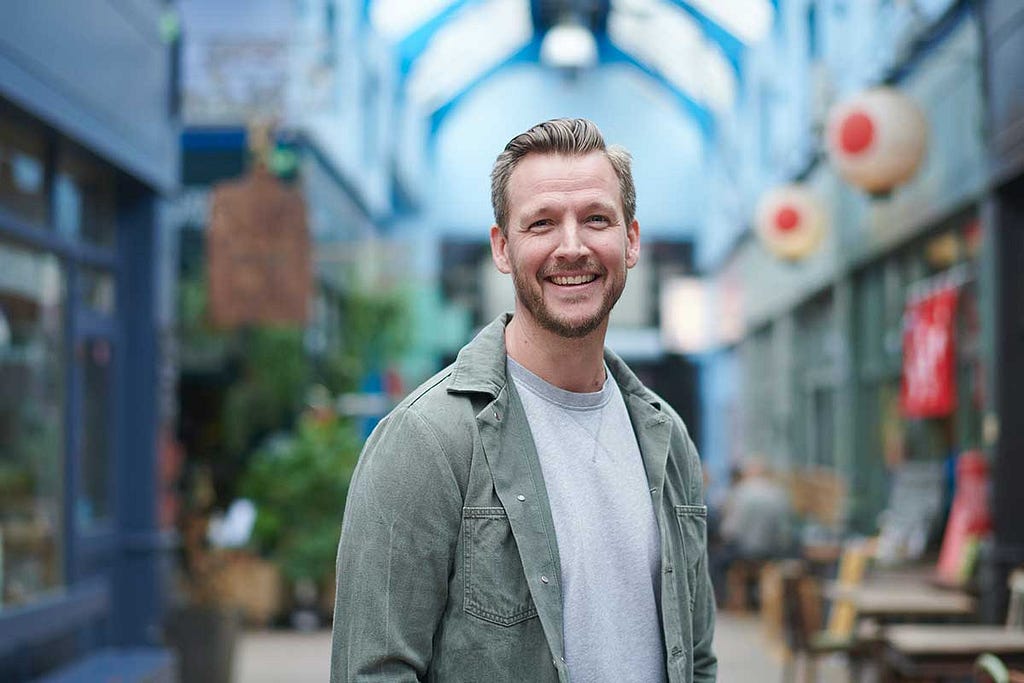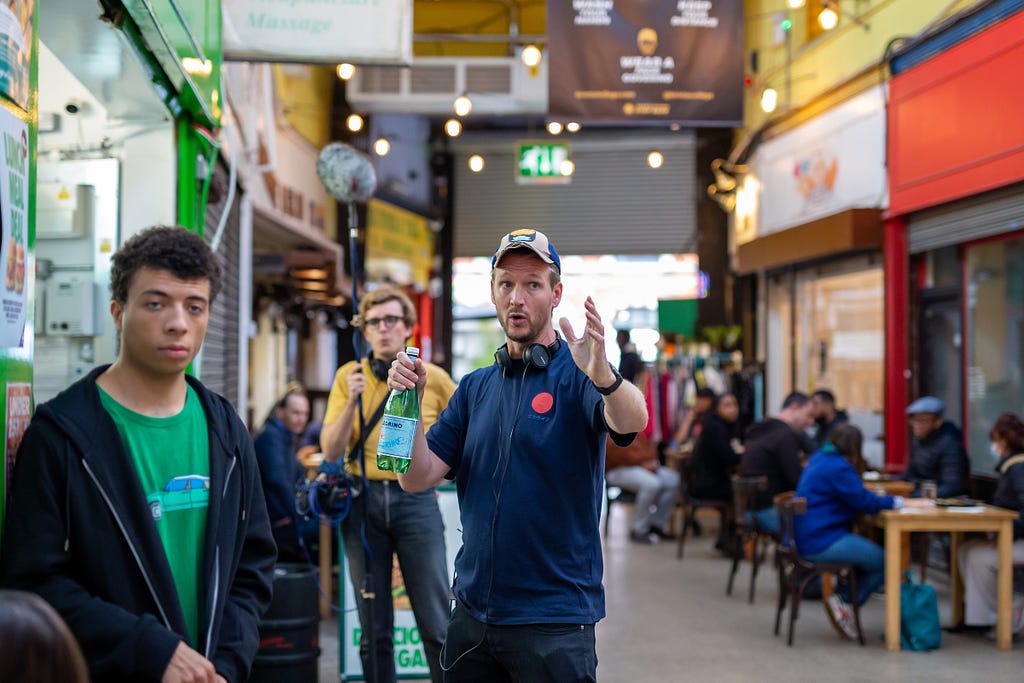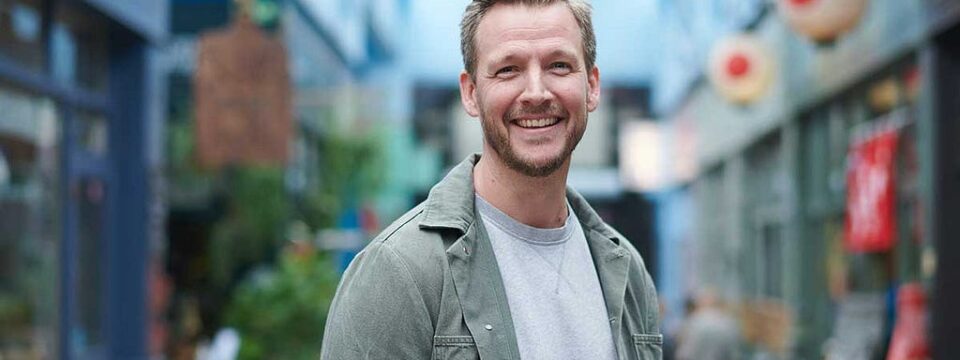
Moving ahead without having it all figured out is really a key part of life, and it’s how some of life’s best discoveries are made and adventures had. Mystery. It’s also very freeing to be able to say, “I don’t know.” — You don’t have to know! Be willing, open, honest and you will learn and grow very quickly.
As a part of our series about “Filmmakers Making A Social Impact” I had the pleasure of interviewing Phil Dunn.
Phil Dunn is a director, writer, poet and owner of Authentive, a production company based in Brixton, South London. With a varied background, having studied Medicine, then Theology, Phil had no formal training in film. Through Authentive, set up in 2005, he learned on the job, making hundreds of films for clients in the corporate, charity, fashion and music sectors. In 2018, Phil felt it was time for him to apply skills he had gained and to one of his own stories. His first short, BOX OFFICE SMASH marked a jumping off point in his career, garnering official selections at prestigious international festivals, winning 14 awards and critical acclaim. His next short film, ABOUT (2020), continued this momentum, winning the same number of awards and obtaining equally impressive reviews, propelling him further into the world of cinema. His third short and most recent short, THE STUPID BOY, is Phil’s most ambitious and personal to date.
Thank you so much for doing this interview with us! Before we dive in, our readers would love to get to know you a bit. Can you share your “backstory” that brought you to this career?
I’ve taken a bit of a circuitous route..! Having played with filmmaking as a teenager, I never thought of it as a career. I was quite idealistic and felt it was important to do something “noble” that made a difference in the world. So my first attempt at a degree was Medicine in London, but after a couple of years, I didn’t pass an exam and realised it wasn’t right for me.
I worked for a church for a stint — running student work, going into prisons, and helping set up a homeless shelter, and during this time, I began making some little films to help connect with the 200 or so students that would come to the church. Then I attempted another degree: this time, Theology up in Durham. I found it to be a fascinating study of what makes human beings tick and the stories that have inspired and shaped culture throughout history. For my dissertation there, I wrote and made a short film, all on a train between London and Cambridge. I enjoyed everything about the process of making it, and on leaving Uni, I set up a production company, making films for clients — anyone who would have me. I learned on the job and was lucky enough to get some consistent clients and some great other freelancers to collaborate with.
But after 10 years of creating to someone else’s brief, I reached a crossroads where I had to make a leap towards my own work before I got too jaded and cynical! THE STUPID BOY is now my 3rd short film, it’s won 36 awards around the world, and is in the running for the OSCARs and BAFTAs in 2024.
I now see film as my way to make a difference. I may not be removing tumours from people’s bodies like my father, but through the stories I tell, I might help people see things they have otherwise missed, and sometimes that’s all we need to be able to change, and even, heal.
It has been said that our mistakes can be our greatest teachers. Can you share a story about the funniest mistake you made when you were first starting? Can you tell us what lesson you learned from that?
When I was still a student, I got sent a credit card and for some reason it had a £3,000 limit. I was just getting into filming stuff, and really wanted a camera of my own. So I blew the whole thing on a fancy new Sony camcorder. I then spent the next 2 years paying off the credit card company! It was probably the stupidest and best thing I ever did. Stupid because the camera must have cost twice as much by the time I had paid it off. But, I don’t regret it, because it meant I had a camera (before phones put one in your pocket) and could film anything and everything, and it became the basis of my business when I finished Uni. Little did I know, but it was an investment in my future. It also taught me the valuable lesson of how independent filmmaking tends to hurt financially!
Who are some of the most interesting people you have interacted with? What was that like? Do you have any stories?
Prisoners and people who live on the street. I used to go into a maximum security prison in Durham (UK) to help the chaplain there with his group sessions. I remember meeting people who had committed murder and other horrible crimes, and being struck by the fact that they were people just like me. We tend to demonise criminals because we need someone to point the finger at — to say “that’s evil” “they’re bad”, but actually, 9 times out of 10, they are just normal people who were in the wrong place, at the wrong time and ended up doing something extreme and terrible. If we were put in the same situation, how different would we be? Sure, some people are psychopaths or just plain evil, but the people I met in that prison weren’t.
Which people in history inspire you the most? Why?
Leonard Cohen, Nick Cave. Johnny Cash. Carl Jung. Mostly people who have been brave enough to explore the shadows and speak from that place.
Let’s now shift to the main focus of our interview, how are you using your success to bring goodness to the world?
I sincerely believe in the power of stories to illuminate and reflect the human condition. If we can see ourselves honestly, we have a chance of tending to our wounds and growing from them; seeing them transformed into a strength. I want to tell stories that acknowledge the incredible difficulty and pain of existence, but also that dare find real hope, and even joy, right in the midst of that. Not despite it, but IN it. “There is a crack in everything. That’s how the light gets in.”
Can you share with us the meaningful or exciting social impact causes you are working on right now?
Honestly? I’m not sure if this counts as a cause, but for me, it’s genuinely my next film. As I said above, I believe films can change the world. It’s called FIRE LILY and it’s based on a poem I wrote after George Floyd’s murder. It grapples with racism, climate change, colonialism, consumerism, global health and the need for us each to face our own shadows in order to truly connect with one another, if we are to have a chance of overcoming some of those challenges facing the human race today. So, all very lighthearted stuff!!
It will be told through a combination of narrative, poetry, original music and dance. — We have a Juilliard School dancer attached, called Nehemiah Spencer, who has such a gift for powerfully conveying truths using his body. Like my last film, it attempts to say something simple and profound, right in the middle of some hefty issues. But I promise it will be beautiful and uplifting. I’m also writing two feature films.
Many of us have ideas, dreams, and passions, but never manifest it. But you did. Was there an “Aha Moment” that made you decide that you were actually going to step up and take action for this cause? What was that final trigger?
Ah I feel so unworthy of this question! Still such a long way to go!
For me, there was this one tiny moment. I was filming a corporate event one day, after about 10 years of running my production company. It was a pretty dry affair, full of jargon and ‘business speak’ that I didn’t understand (I never did), and I had this strange moment where I kind of woke up next to the camera and thought, “what am I doing here?!” It was like one of those dreams where you are naked and you suddenly realise. I felt so strongly that I needed to apologise to everyone; that I wasn’t supposed to be there and that I really had to leave. I didn’t do that, BUT it made me realise, I had gone further down that dead-end street (for me) than I should have done. It was time to get out. That’s when I began writing my first proper short, BOX OFFICE SMASH. If you watch it (it’s on Amazon prime) you’ll see how it connects to that moment. The title hints at it heavily anyway.
Can you tell us a story about a particular individual who was impacted or helped by your cause?
Oh man, these questions! Again, I’m just a filmmaker, so they probably don’t apply to me in the same way. But I think of one person who watched my latest short THE STUPID BOY — she couldn’t stop crying for the next hour after watching it. I felt so responsible! But I know that tears are healing, and I like to think that that changed things for her, at least a little. That’s all we can do, right?
Are there three things that individuals, society or the government can do to support you in this effort?
Ha yes! 1. Watch THE STUPID BOY. 2. Fund my next film! Or go fund an artist you believe in. Invest. Buy some of their work. Art is literally vital for human existence. I love the graffiti somewhere that says “The EARTH without ART is just EH?” It amazes me that governments don’t realise how important it is, particularly ours in the UK. So, number 3 would be: Government: Make it easier to access funding for the arts in the UK.

What are your “5 things I wish someone told me when I first started” and why? Please share a story or example for each.
1. Listen to the crazy ideas in your head.
I have found that the more space you make for an idea, the more it will grow, and take shape or morph into something bigger. I used to suppress the strange thoughts in my head and think of them as stupid. But now I see them as things that are completely unique — a gift.
2. Play the long game.
Like many people, I dreamed of being an “overnight success”, maybe a rock star, or just super famous somehow. But I’m glad that that didn’t happen, and I wish I had reconciled myself to the longer process sooner, rather than waste energy wishing it away. The long game means you can build something that lasts, something that will stand the storms of life. Take your time, dig those foundations, find your roots, love your friends, face your demons, tend to your wounds, do some therapy! Don’t reach for success. All of this will make you more capable of being truly yourself in the world; to be able to love and receive love. Really that’s all that there is, and should be the only measurement of success.
3. Don’t wait for an invitation, permission or validation.
When I was making films for clients, I kept hoping that one day someone would come and ask me to make a big movie. It was totally unrealistic. I was waiting for someone else to initiate the thing within me that I really wanted to do. I remember one evening where I got a few of my most trusted friends over for dinner and I literally asked their permission to make films and poetry. For some reason, I felt I wasn’t allowed to go after the thing I really wanted, and I needed it to be okayed by someone else. Of course, my friends told me to go for it.
4. Embrace your own story. Whatever is most personal is most universal.
The more therapy I have done (and I have done tons!), the more I have come to accept the things I have been through and watched them be transformed into something good and lifegiving. We are all in our own unique story that has never been told before, and we have some say over what happens in that story. Even when bad things happen, we have a choice about how we respond to them, and can see something terrible transformed. I think that’s what is amazing about humans. I have also found that connecting with my own story
5. Are you ok with not knowing?
Moving ahead without having it all figured out is really a key part of life, and it’s how some of life’s best discoveries are made and adventures had. Mystery. It’s also very freeing to be able to say, “I don’t know.” — You don’t have to know! Be willing, open, honest and you will learn and grow very quickly.
If you could tell other young people one thing about why they should consider making a positive impact on our environment or society, like you, what would you tell them?
See the quote from Howard Thurman below. You have a unique place in this world that only you can inhabit, a role that only you can fulfil, and it comes from within you, not from outside expectations or a sense of duty. If you do you, the world will be better for it.
We are very blessed that many other Social Impact Heroes read this column. Is there a person in the world, or in the US, whom you would like to collaborate with, and why? He or she might see this. 🙂
Can I say two?
Theaster Gates. I watched his episode in the series “Home” on Apple TV and have been following him ever since. He is an artist who has affected the world around him through making.
Viola Davis — I really want her to voice the poem in my next short FIRE LILY. She is an amazing actor and amazing woman.
Can you please give us your favorite “Life Lesson Quote”? Can you share how that was relevant to you in your life?
“Don’t ask yourself what the world needs. Ask yourself what it is that makes you come alive, and go do that. Because what the world needs is people who have come alive.” — Howard Thurman.
I thought the world needed me to be a doctor, or a priest, but what makes me come alive is making films, and now my stories are beginning to reach thousands of people around the world.
How can our readers follow you online?
Instagram: @phildcdunn @thestupidboyfilm Website: https://www.phildunn.uk/
This was great, thank you so much for sharing your story and doing this with us. We wish you continued success!
Thank you!
Filmmakers Making A Social Impact: Why & How Filmmaker Phil Dunn Is Helping To Change Our World was originally published in Authority Magazine on Medium, where people are continuing the conversation by highlighting and responding to this story.
